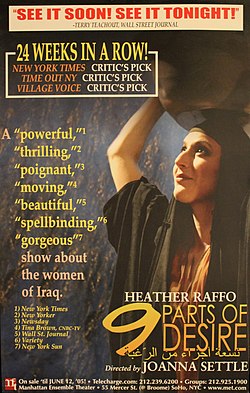Nine Parts of Desire (play)
| 9 Parts of Desire | |
|---|---|

Poster from the Manhattan Ensemble Theatre production, 2005
|
|
| Written by | Heather Raffo |
| Characters | Character list |
| Date premiered | October 9, 2004 |
| Place premiered | Manhattan Ensemble Theatre, New York City |
| Original language | English |
Nine Parts of Desire (Arabic: تسعة اجزاء من الرغبة) is a play written by Heather Raffo.
In the original version of the play, a single performer plays all nine characters. Heather Raffo herself has acted in productions of Nine Parts of Desire. Some productions opt to use multiple actors. Joanna Settle directed the play's first productions.
Michael Billington of The Guardian wrote that the play's "great virtue" "is that it not only deals with the plight of Iraqi women but forces us to confront the moral issues of war." Melissa Rose Bernardo of Entertainment Weekly wrote that "What Raffo unearths, beneath the aforementioned Saddam-inflicted atrocities, is the universal and very basic human trait of insecurity." Billington added that "The play raises a difficult question, especially for those opposed to the recent war: what should the west have done about Iraq?"
The title originates from a statement from Ali that "God created sexual desire in 10 parts; then he gave nine parts to women and one to men." This statement is from a hadith in the 100 Maxims of Imam Ali. Lauren Sandler of The New York Times wrote that "The play's emphasis on sex is inherent in its title."Geraldine Brooks had used this statement as a title of her 1995 book, Nine Parts of Desire. The only aspect the book by Brooks and the play share are the title. Raffo thanked Brooks for inspiration in the program of the play.
During an August 1993 trip to Baghdad to see family, Heather Raffo visited the Saddam Art Center. According to Raffo, a painting titled "Savagery", depicting a naked woman holding onto a tree, gave her the inspiration to make this play. This painting was made by Layla al-Attar. Raffo was curious about the life of Al-Attar, and in the play she placed the al-Attar character prominently.
Raffo had, for ten years, interviewed Iraqi women from various social backgrounds, and she used this information to write the play. Some women were strangers to her and some were relatives. According to Raffo, "[being an Iraqi] got me in the door" but that the women were more willing to confide in her because she was also an American.
...
Wikipedia
